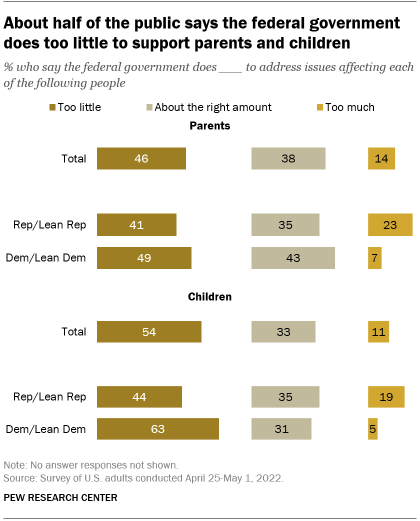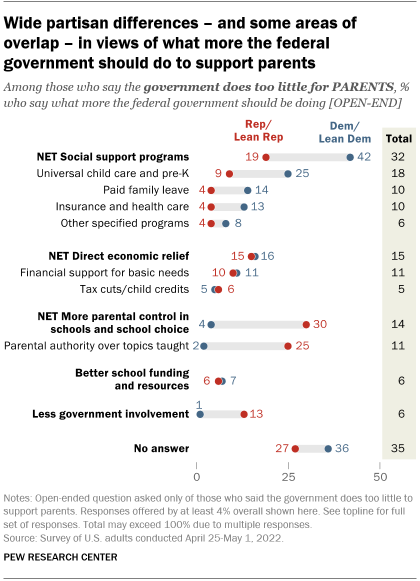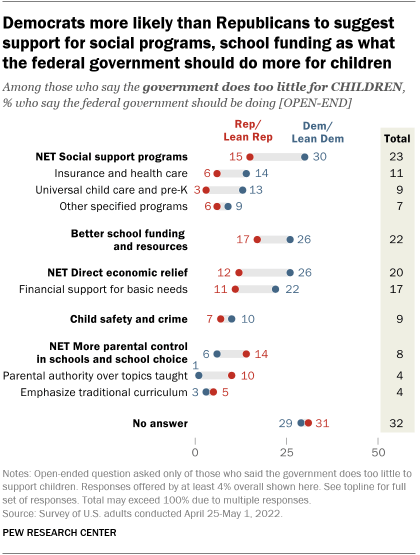
Almost half of U.S. adults (46%) say the federal government does too little to address issues affecting parents, while a slim majority (54%) say the government does too little to address issues facing children. Asked what more the government should do to support parents and children, Americans frequently mention forms of social or direct financial support, though Democrats and Republicans often offer different suggestions.

About four-in-ten adults say the government does the right amount for parents (38%) and a third say the same for children. About one-in-ten say the government does too much for both groups, according to a Pew Research Center survey conducted this spring.
Opinions on these questions do not differ by parental status or across most demographic groups. However, there are significant partisan divides in views of how much the government addresses the issues of parents and children.
Pew Research Center conducted this study to better understand Americans’ views of how effectively the government is handling issues facing parents and children in the country. For this analysis, we surveyed a total of 5,074 U.S. adults in April and May 2022. Of those who responded that the government does too little to address the issues of each group, we probed them with open-ended questions to understand what more the government could do to support them. Researchers then coded these responses. Everyone who took part in this survey is a member of the Center’s American Trends Panel (ATP), an online survey panel that is recruited through national, random sampling of residential addresses. This way nearly all U.S. adults have a chance of selection. The survey is weighted to be representative of the U.S. adult population by gender, race, ethnicity, partisan affiliation, education and other categories. Read more about the ATP’s methodology.
Here are the questions used for the analysis, along with responses, and its methodology.
Nearly two-thirds of Democrats and Democratic-leaning independents (63%) say the federal government does too little to address issues facing children, compared with 44% of Republicans and GOP leaners. By contrast, Republicans are more likely than Democrats to say the government does too much for children (19% vs. 5%).
The partisan gap is slightly smaller on how the federal government handles issues concerning parents: 49% of Democrats and 41% of Republicans say the federal government does too little to address these issues. Still, Republicans are significantly more likely than Democrats to say that the federal government does too much to address issues affecting parents (23% vs. 7%).

When those who say the government does too little for parents are asked in an open-ended format what more they would like to see the government do, they offer a variety of responses, ranging from support for more child-related social programs (32%) and economic relief programs (15%) to more parental control in schools (14%) and better funding for schools (6%). Another 6% say the federal government should be less involved and instead should allow state and local governments to have more control on issues concerning parents.
Democrats are more than twice as likely as Republicans (42% vs. 19%) to mention they would like to see more social support programs, such as paid family leave and universal child care. A Democrat in their 30s said the government should “guarantee paid parental leave like other countries, strengthen the health care system to reduce maternal mortality, [and] build and strengthen support systems for working parents.”
Republicans, conversely, are far more likely than Democrats (30% vs. 4%) to offer responses about wanting the government to help parents have more control in education, mentioning that parents should have more control over curriculum and school choice for their children.
As one Republican in their 70s said, the government needs “to be more open to parents’ concerns. Parents want a voice in their children’s education – keeping activist programs, like CRT [critical race theory] and a woke agenda, out; more reading, writing and arithmetic in.”
About one-in-ten Republicans (13%) say the government should have less involvement with parents entirely. A Republican in their 30s put it this way: “They should be enacting policies that strengthen the family and give parents the ability to raise their children as they see fit rather than giving that power to the public education system.”
Some other commonly cited areas where the government should do more for parents are about equally likely to be offered by Republicans and Democrats. For example, 15% of Republicans and 16% of Democrats say the government could be doing more to provide direct economic relief to parents and families.
One Republican in their 30s said the government should “promote healthy traditional families with tax policy and support programs,” adding, “Today, traditional families are on their own.”
Similar shares of Democrats (7%) and Republicans (6%) also say the government could be doing more to fund schools. A Democrat in their 20s said, “They need to be ensuring that K-12 education is properly funded and that children get a quality education no matter where they live – including free preschool. There also need to be controls on how much university tuition is so that the only options are not going into debt or expecting parents to have saved enough money to afford it.”
Among those who say the government does too little for children, responses of what the government should do to provide more support are largely similar to those for parents. But there is somewhat more variety in the suggestions for what the government can do to help children.

Nearly a quarter of those who say the government does too little for children say it should provide more social support programs (23%), with similar shares mentioning better school funding (22%) and direct economic relief (20%).
Paralleling the responses for what the federal government should do to address issues facing parents, Democrats are twice as likely as Republicans to mention social support programs as ways to address issues affecting children (30% vs. 15%). Republicans are far more likely to offer that there should be more parental control in education; 14% of Republicans mentioned this, compared with 6% of Democrats.
Note: Here are the questions used for the analysis, along with responses, and its methodology.




